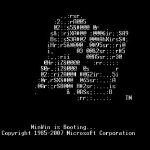Microsoft: Windows 7 Family Pack wasn't 'pulled,' it just sold out

In response to a Saturday story from Betanews contributor Joe Wilcox, a Microsoft spokesperson told Betanews this afternoon that "the offer has not been 'pulled'" -- specifically, that it did not revoke anything with regard to its three-license Windows 7 Home Premium Family Pack offer. It simply sold out, as Microsoft says its "while supplies last" offer clearly indicated as early as last July.
"The Windows 7 Family Pack was introduced as a limited time offer while supplies last in select geographies," the spokesperson told us. "Response has been very positive and, in some cases, the offer has sold out. Customers interested in upgrading their PCs should purchase Home Premium, Professional, or Ultimate upgrade products."
Intel's marriage of CPU and GPU not ready for prime time

A spokesperson for Intel confirmed to Betanews this morning that the company's highly anticipated initial release of a commercial processor product based on its CPU+GPU architecture, code-named "Larrabee," will not come within early 2010 after all. This despite the first public demonstration late last September that seemed to indicate all was on track for a release in the first half of 2010.
"Larrabee silicon and software development are behind where we had hoped to be at this point in the project," stated spokesperson Nick Knupffer. "As a result, our first Larrabee product will not be launched as a standalone discrete graphics preoduct, but rather be used as a software development platform for internal and external use."
Report: Microsoft to randomize Europe's browser screen choices

The New York Times has cited an unidentified source said to have knowledge of Microsoft's ongoing negotiations with the European Commission, as saying that the company will comply with a suggestion made by three of its chief rivals in the Web browser business -- Mozilla, Google, and Opera. Specifically, the report says, future editions of Windows 7 for European customers will randomize the order in which users' choices for default Web browsers will appear during setup.
You'll notice that Apple was not listed among those making the suggestion, and that may be because Microsoft's revised plan in order that Internet Explorer would not be listed first, would have alphabetized the list by manufacturer's name, placing Apple Safari first instead.
Bing bonked by service outage Thursday, Microsoft configured the wrong server

For about 40 minutes starting at approximately 9:30 pm EST Thursday evening, by Betanews estimates, the main page of Microsoft's Bing Web site was inaccessible to users. In its place was a message filled with hexadecimal code, leading off with the message, "This isn't the page you wanted!"
No kidding. But was Bing being hijacked? As Microsoft acknowledged this morning, its own administrators were responsible for the outage.
Acer eclipses Dell for #2 spot in global PC shipments, says iSuppli data

At the rate at which Acer (which now also includes Gateway, Packard Bell, and e-Machines) was catching up with Dell, analysts predicted at this time last year that it could conceivably top Dell in units shipped worldwide by the third quarter of 2009. For once in this wacky economy, the analysts' predictions turned out to be correct: Acer is now the world's #2 PC producer in terms of units shipped, according to iSuppli.
But Acer is not catching up to Hewlett-Packard too fast, in any other regard besides placement on the list. HP's market share continues its strong rise, as the entire PC market enjoyed a nice recovery last month...and Dell shared in absolutely none of it.
The Black Screen Syndrome, or, Tech news in search of the apocalypse

Was the "Black Screen of Death" issue (KSoD) covered by Betanews earlier this week a real story? This is a serious question, especially in the wake of security firm Prevx's admission that it was very premature in its conclusions that KSoD incidents had been triggered by last month's round of Patch Tuesday updates.
Let's discuss this rationally. Although it does not appear to be an exploitable security problem by malicious users, and we have reason to believe it cannot become one, the KSoD problem (differentiated from BSoD, the "Blue Screen of Death," something else entirely) is a strange symptom that has cropped up on some machines over the years -- in our experience, some Vista-based systems. Some. It is a significant enough problem that when Betanews encountered it first-hand last June, and I discovered a way for users to fish themselves out from being stuck with it (without installing any new software), I wrote about it and presented a solution that, at least, worked for me.
Comcast deal for NBC Universal is about content, not broadband

After this morning, there should be no question in anyone's minds whatsoever as to what Comcast's deal with General Electric for control of NBC Universal is about: NBCU is a huge producer of cable TV content, and Comcast would like to be the parent company of that producer. The deal isn't so much about Hulu, or new media, or creating some walled garden around content distribution, as many would have believed and expected.
Comcast CEO Brian Roberts made this fact pretty clear during Comcast's investor earnings call this morning: This is not a technology deal. Comcast, the pipeline company, is already making deals in the technology side, including providing 10% of the operating capital of Clearwire. The pipeline company is going ahead with its plans to produce its own Web-based on-demand distribution network, which Broadcasting & Cable has learned will be called Xfinity. (Comcast must have used the same consultant Sprint used to come up with "Xohm.") And in response to direct questions today as to whether Comcast's indirect acquisition of NBCU's stake in video service Hulu would change Comcast's plans for deploying "TV Everywhere," Comcast COO Stephen Burke responded that he believed NBC's restraint in releasing its own content to Hulu was "smart," and that Comcast would let NBC continue in that regard.
Mark Russinovich on MinWin, the new core of Windows

Since the first public news of Windows 7's development back on October 2007, we've heard about a component of the operating system called MinWin -- a tantalizingly titled element that sounds like some kind of portable Windows kernel. Now Windows 7 is actually residing on paying consumers' desktops, and inside of it -- and inside of Windows Server 2008 R2 -- is the MinWin kernel architecture...and yet few have been made clear as to what it actually is.
A few weeks ago in Los Angeles, Microsoft technical fellow Mark Russinovich -- absolutely the world's leading authority on Windows performance and architecture -- took time to explain to developers attending PDC 2009 in Los Angeles exactly what this is. In summary, it's a way to graft onto Windows some semblance of the architectural layering it should have had, if its architects in the 1980s had any foresight into how Windows would be used thirty years later. It enables current and future Microsoft developers to evolve new configurations of the operating system, without having to rewrite core services or worry about breaking dependencies between those services and upper-level APIs.
Google begrudgingly adjusts news crawling for paid publishers

With a group of blog posts this morning, one of which literally said paid content was probably not a good idea anyway, Google announced it was making an adjustment to its First Click Free aggregation scheme for news publishers. The adjustment to the service, first rolled out in 2007, will now enable readers to sample more content before subscribing through the publisher's own portal.
"While we're happy to see that a number of publishers are already using First Click Free, we've found that some who might try it are worried about people abusing the spirit of First Click Free to access almost all of their content," reads this morning's post to Google's Webmaster Central blog. "As most users are generally happy to be able to access just a few pages from these premium content providers, we've decided to allow publishers to limit the number of accesses under the First Click Free policy to five free accesses per user each day."
Fee or free? Murdoch, Huffington square off over the cost of Internet news

The problem remains: How can a business be profitable at producing news for the Internet audience when the principal method for ensuring that the news is visible to that audience, is a free system? The US Federal Trade Commission could not have chosen two more appropriate representatives of the opposite poles of this issue than News Corp. Chairman Rupert Murdoch and mega-blog editor Arianna Huffington, to head its public workshop in Washington yesterday on the subject of the future of the online news industry.
In one corner stood the world's largest producer of financial news, currently afflicted with the problem of its core product becoming publicly disseminated in a manner that bypasses its mechanism for charging for it. In the other corner is arguably the Web's most successful blog publisher, who argues that the free Web is merely the new, permanent reality, and that the long-term solution to the profitability problem is to empower "citizen journalists" with the impetus to produce original journalism for little or no compensation.
Security firm: Windows patches not responsible for 'Black Screen of Death'

When Betanews reported last June about occurrences of the infamous "Black Screen of Death" (KSoD) in Windows Vista, a reader wrote to suggest to us that we might have only considered the matter so important this late in the game because suddenly it happened to us. A similar opinion may be appropriate for British security firm Prevx, which now says it has "exonerated" last month's set of Patch Tuesday updates from Microsoft as the cause of what it called last night a "crop" of KSoD incidents.
Early Tuesday evening, Prevx director of malware research Jacques Erasmus reported on his company's blog that he and his team have made "significant progress in determining specific triggers of the black screen event." Specifically, it determined that a side-effect accidentally discovered over three years ago by none other than SysInternals' Mark Russinovich (now with Microsoft), led to instances where Windows' product activation inadvertently triggered the black screen. When a System Registry entry of String type is supposed to be terminated by a null character (0) but isn't, the result is that the entry itself may disappear from REGEDIT, Windows' well-known Registry Editor. Such an entry may also trigger KSoD conditions.
Apple settles with Psystar except for 'circumvention devices'

It would appear that Apple Inc. and Mac clone maker Psystar were on the way to a complete settlement that would have been announced today, but for one small hitch: Psystar wants to continue selling a $49.99 software package called Rebel EFI, which claims to enable the installation of "every operating system" on an Intel-based computer. However, it's clear from the product's Snow Leopard skin exactly which OS it's really referring to.
Just when this whole conflict might have ended, Apple referred to this piece of software in its request for a permanent injunction against Psystar last week, calling it a "circumvention device." In fact, the company came dangerously close to suggesting that it was this device, not the Psystar Open computer itself, that was the infringing element -- a suggestion that, if the judge had agreed with it, might have ended up endangering a big money award for Apple.
Microsoft denies latest 'Black Screen of Death' claims

A spokesperson for Microsoft told Betanews early this afternoon that it has officially investigated claims that its latest security updates are the cause of an alleged "crop" of "Black Screen of Death" incidents, for which British security firm Prevx hurriedly released something billed as a possible fix. The claims, the company says, are unfounded.
"Microsoft has investigated reports that its latest release of security updates is resulting in system issues for some customers due to changes made by the security updates to the registry," the spokesperson told us. "Our comprehensive investigation has shown that the November security updates, the Microsoft Malicious Software Removal Tool, and the non-security updates we released through Windows Update in November do not make any changes to the registry as claimed. We do not believe Microsoft Updates are related to the behavior described in these reports."
Latest Firefox 3.6 beta fixes 133 bugs, promises faster page load times

Download Mozilla Firefox 3.6 Beta 4 for Windows from Fileforum now.
As Web users anticipate data from NetApplications and other services that could show Mozilla Firefox having eclipsed the 25% mark in global usage share for the month of November, the beta process for Firefox 3.6 has found an extra gear. Demonstrating that more user input can result in a faster turnover process for developers' builds, rather than the slower process some commercial software producers claim, the latest Beta 4 release addresses some 133 significant bugs, many uncovered by regular testers.
Confirmed: Office 2010 to ship in June

After several Web sites today claimed to having seen a possibly inadvertent notice from Microsoft claiming June as the release month for its forthcoming Office 2010 (we looked hard and couldn't find it ourselves), a Microsoft spokesperson confirmed to Betanews this afternoon that June is indeed the ship month.
The news comes two weeks after the company's PDC 2009 conference in Los Angeles, where we had expected not only to see the final shipping date but to hear a lot more about Office and Office Web Apps. What was on many attendees minds even after leaving the last day of the show was, what will make Office 2010 worth the upgrade, and what will not be in Office Web Apps that will be in Office 2010? In an interview during the conference, company communications senior director Janice Kapner told Betanews that to some extent, the answers to those questions are still being determined by users.
BetaNews, your source for breaking tech news, reviews, and in-depth reporting since 1998.
© 1998-2025 BetaNews, Inc. All Rights Reserved. About Us - Privacy Policy - Cookie Policy - Sitemap.
